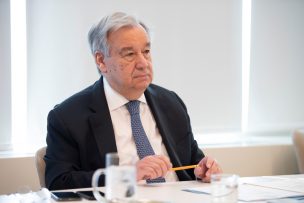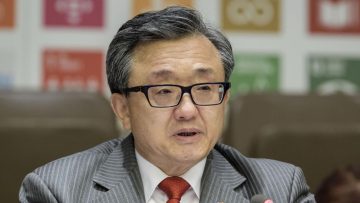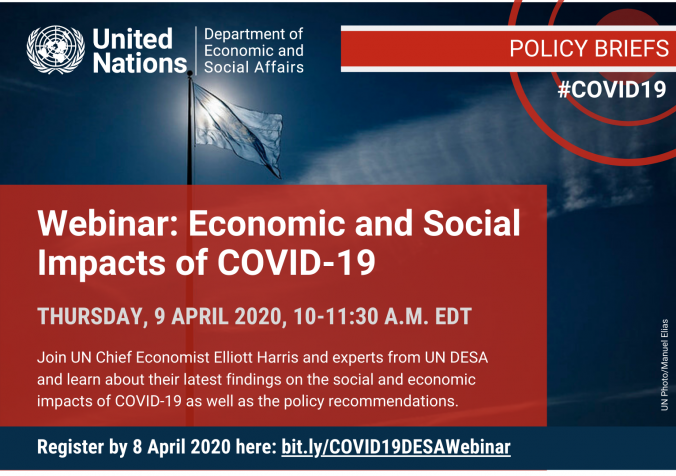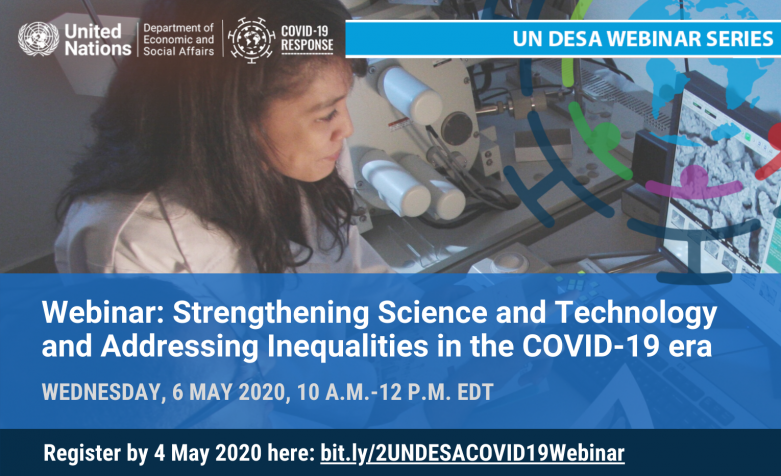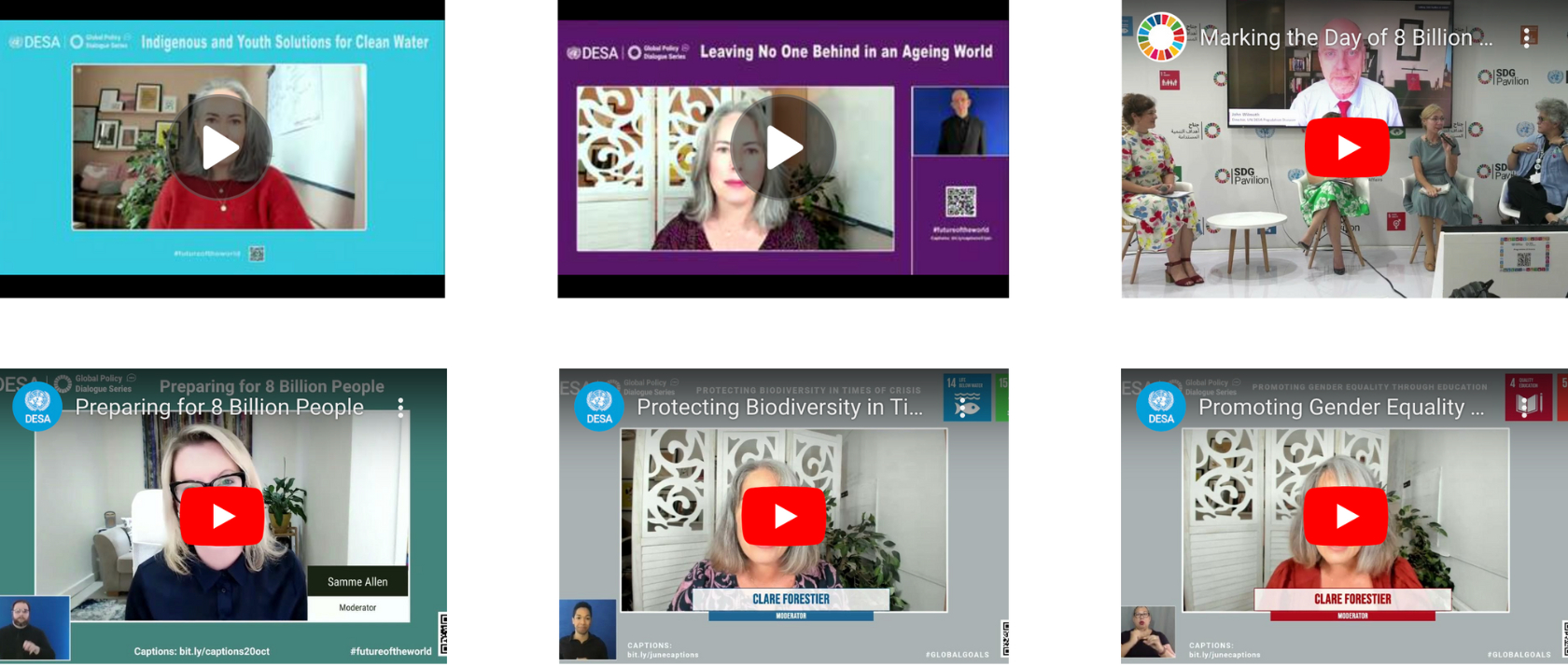
We are facing a global health crisis unlike any in the 75-year history of the United Nations — one that is killing people, spreading human suffering, and upending people’s lives. But this is much more than a health crisis. It is a human, economic and social crisis. The coronavirus disease (COVID-19), which has been characterized as a pandemic by the World Health Organization (WHO), is attacking societies at their core.
The UN Department of Economic and Social Affairs (UN DESA) is a pioneer of sustainable development and the home of the Sustainable Development Goals (SDGs), where each goal finds its space and where all stakeholders can do their part to leave no one behind. UN DESA through the Division for Inclusive Social Development (DISD), monitors national and global socio-economic trends, identifies emerging issues, and assesses their implications for social policy at the national and international levels. To this end, we are a leading analytical voice for promoting social inclusion, reducing inequalities and eradicating poverty.
The COVID-19 outbreak affects all segments of the population and is particularly detrimental to members of those social groups in the most vulnerable situations, continues to affect populations, including people living in poverty situations, older persons, persons with disabilities, youth, and indigenous peoples. Early evidence indicates that that the health and economic impacts of the virus are being borne disproportionately by poor people. For example, homeless people, because they may be unable to safely shelter in place, are highly exposed to the danger of the virus. People without access to running water, refugees, migrants, or displaced persons also stand to suffer disproportionately both from the pandemic and its aftermath – whether due to limited movement, fewer employment opportunities, increased xenophobia etc.
If not properly addressed through policy the social crisis created by the COVID-19 pandemic may also increase inequality, exclusion, discrimination and global unemployment in the medium and long term. Comprehensive, universal social protection systems, when in place, play a much durable role in protecting workers and in reducing the prevalence of poverty, since they act as automatic stabilizers. That is, they provide basic income security at all times, thereby enhancing people’s capacity to manage and overcome shocks.
As emphasized by the United Nations Secretary-General, during the launch of a COVID-19 Global Humanitarian Response Plan on 23 March 2020 “We must come to the aid of the ultra-vulnerable – millions upon millions of people who are least able to protect themselves. This is a matter of basic human solidarity. It is also crucial for combating the virus. This is the moment to step up for the vulnerable.”
Older Persons
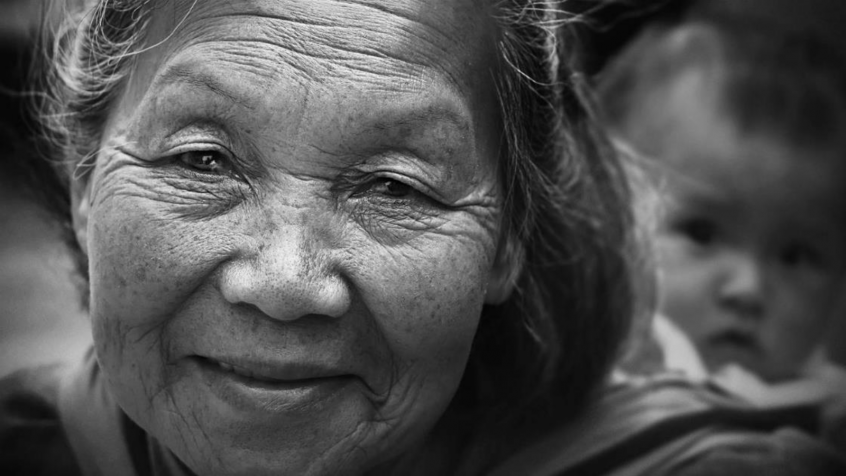 Older persons are particularly susceptible to the risk of infection from COVID-19, especially those with chronic health conditions such as hypertension, cardiovascular disease and diabetes.
Older persons are particularly susceptible to the risk of infection from COVID-19, especially those with chronic health conditions such as hypertension, cardiovascular disease and diabetes.
Older persons are not just struggling with greater health risks but are also likely to be less capable of supporting themselves in isolation. Although social distancing is necessary to reduce the spread of the disease, if not implemented correctly, such measures can also lead to increased social isolation of older persons at a time when they may be at most need of support.
The discourse around COVID-19, in which it is perceived as a disease of older people, exacerbates negative stereotypes about older persons who may be viewed as weak, unimportant and a burden on society. Such age-based discrimination may manifest in the provision of services because the treatment of older persons may be perceived to have less value than the treatment of younger generations. International human rights law guarantees everyone the right to the highest attainable standard of health and obligates Governments to take steps to provide medical care to those who need it. Shortages of ventilators, for example, necessitate the adoption of triage policies and protocols based on medical, evidence-based and ethical factors, rather than arbitrary decisions based on age.
In this context, solidarity between generations, combating discrimination against older people, and upholding the right to health, including access to information, care and medical services is key. Read more..
Persons with Disabilities
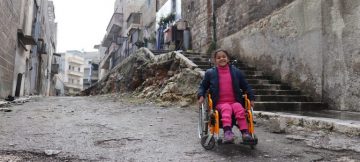 Even at the best of times, persons with disabilities face challenges in accessing health-care services, due to lack of availability, accessibility, affordability, as well as stigma and discrimination. The risks of infection from COVID-19 for persons with disabilities are compounded by other issues, which warrant specific action: disruption of services and support, pre-existing health conditions in some cases which leave them more at risk of developing serious illness or dying, being excluded from health information and mainstream health provision, living in a world where accessibility is often limited and where barriers to goods and services are a challenge, and being disproportionately more likely to live in institutional settings.
Even at the best of times, persons with disabilities face challenges in accessing health-care services, due to lack of availability, accessibility, affordability, as well as stigma and discrimination. The risks of infection from COVID-19 for persons with disabilities are compounded by other issues, which warrant specific action: disruption of services and support, pre-existing health conditions in some cases which leave them more at risk of developing serious illness or dying, being excluded from health information and mainstream health provision, living in a world where accessibility is often limited and where barriers to goods and services are a challenge, and being disproportionately more likely to live in institutional settings.
General individual self-care and other preventive measures against the COVID-19 outbreak can entail challenges for persons with disabilities. For instance, some persons with disabilities may have difficulties in implementing measures to keep the virus at bay, including personal hygiene and recommended frequent cleaning of surfaces and homes. Cleaning homes and washing hands frequently can be challenging, due to physical impairments, environmental barriers, or interrupted services. Others may not be able to practice social distancing or cannot isolate themselves as thoroughly as other people, because they require regular help and support from other people for every day self-care tasks.
To ensure that persons with disabilities are able to access to information on COVID-19, it must be made available in accessible formats. Healthcare buildings must also be physically accessible to persons with mobility, sensory and cognitive impairments. Moreover, persons with disabilities must not be prevented from accessing the health services they need in times of emergency due to any financial barriers. Read more..
Youth
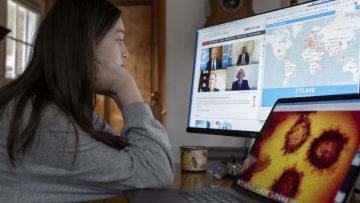 Many governments have called on youth to embrace the effort to protect themselves and the overall population. Youth are also in a position to help those who are most vulnerable, and to aid in increasing public health social awareness campaigns among their communities. Thus, youth are critical to limiting the virus’s spread and its impact on public health, society, and the economy at large.
Many governments have called on youth to embrace the effort to protect themselves and the overall population. Youth are also in a position to help those who are most vulnerable, and to aid in increasing public health social awareness campaigns among their communities. Thus, youth are critical to limiting the virus’s spread and its impact on public health, society, and the economy at large.
In terms of employment, youth are disproportionately unemployed, and those who are employed often work in the informal economy or gig economy, on precarious contracts or in the service sectors of the economy, that are likely to be severely affected by COVID-19.
More than one billion youth are now no longer physically in school after the closure of schools and universities across many jurisdictions. The disruption in education and learning could have medium and long-term consequences on the quality of education, though the efforts made by teachers, school administrations, local and national governments to cope with the unprecedented circumstances to the best of their ability should be recognized.
Many vulnerable youth such as migrants or homeless youth are in precarious situations. They are the ones who can easily be overlooked if governments do not pay specific attention, as they tend to be already in a situation without even their minimum requirements being met on health, education, employment and well-being. Read more..
Families
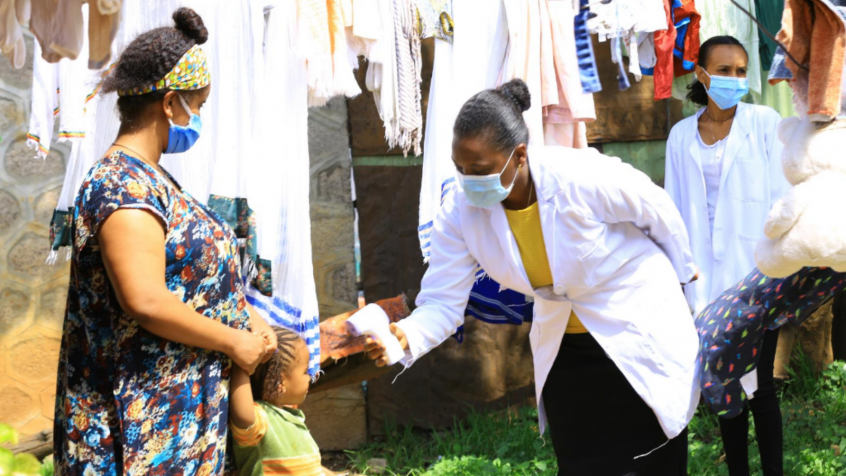 The Impact of the Pandemic on Family Life Across Cultures is an international research study led by Dr. Anis Ben Brik, distinguished and acknowledged expert in Social Policy and Sustainable Development, LSE alumnus, now Associate Professor at Hamad Bin Khalifa University College of Public Policy in Qatar explores the effects of the coronavirus pandemic on family life across cultures. Twenty-one researchers from 40 countries across five continents are participating in this study. Eighteen partners are also contributing to this work. UNDESA is part of the project, sharing other participants’ vision and priority for the life and work of the home. Learn more about COVID-19 and Families.
The Impact of the Pandemic on Family Life Across Cultures is an international research study led by Dr. Anis Ben Brik, distinguished and acknowledged expert in Social Policy and Sustainable Development, LSE alumnus, now Associate Professor at Hamad Bin Khalifa University College of Public Policy in Qatar explores the effects of the coronavirus pandemic on family life across cultures. Twenty-one researchers from 40 countries across five continents are participating in this study. Eighteen partners are also contributing to this work. UNDESA is part of the project, sharing other participants’ vision and priority for the life and work of the home. Learn more about COVID-19 and Families.
Indigenous Peoples
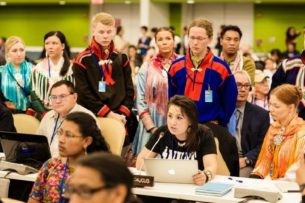 Indigenous peoples are particularly vulnerable at this time due to significantly higher rates of communicable and non-communicable diseases, lack of access to essential services, absence of culturally appropriate healthcare, and if any, under-equipped and under-staffed local medical facilities.
Indigenous peoples are particularly vulnerable at this time due to significantly higher rates of communicable and non-communicable diseases, lack of access to essential services, absence of culturally appropriate healthcare, and if any, under-equipped and under-staffed local medical facilities.
The first point of prevention is the dissemination of information in indigenous languages, thus ensuring that services and facilities are appropriate to the specific situation of indigenous peoples, and all are reached.
The large number of indigenous peoples who are outside of the social protection system further contributes to vulnerability, particularly if they are dependent on income from the broader economy – produce, tourism, handicrafts and employment in urban areas. In this regard, Governments should ensure that interim financial support measures include indigenous peoples and other vulnerable groups.
Indigenous peoples are also seeking their own solutions to this pandemic. They are taking action and using traditional knowledge and practices as well as preventive measures – in their languages. Read more..
Sport for Development and Peace
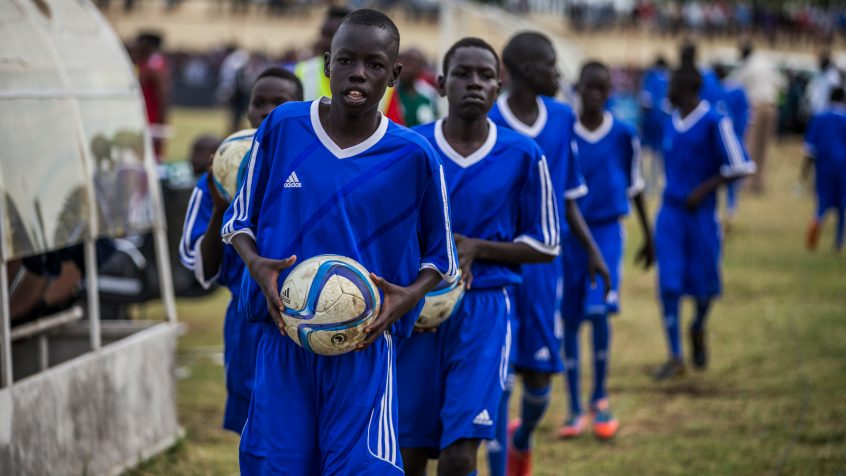 Sport is a major contributor to economic and social development. Its role is well recognized by Governments, including in the Political Declaration of the 2030 Agenda, which reflects on “the contribution sports make to the empowerment of women and of young people, individuals and communities, as well as to health, education and social inclusion objectives.”
Sport is a major contributor to economic and social development. Its role is well recognized by Governments, including in the Political Declaration of the 2030 Agenda, which reflects on “the contribution sports make to the empowerment of women and of young people, individuals and communities, as well as to health, education and social inclusion objectives.”
Since its onset, the COVID-19 pandemic has spread to almost all countries of the world. Social and physical distancing measures, lockdowns of businesses, schools and overall social life, which have become commonplace to curtail the spread of the disease, have also disrupted many regular aspects of life, including sport and physical activity. This policy brief highlights the challenges COVID-19 has posed to both the sporting world and to physical activity and well-being, including for marginalized or vulnerable groups. It further provides recommendations for Governments and other stakeholders, as well as for the UN system, to support the safe reopening of sporting events, as well as to support physical activity during the pandemic and beyond.
To safeguard the health of athletes and others involved, most major sporting events at international, regional and national levels have been cancelled or postponed – from marathons to football tournaments, athletics championships to basketball games, handball to ice hockey, rugby, cricket, sailing, skiing, weightlifting to wrestling and more. The Olympics and Paralympics, for the first time in the history of the modern games, have been postponed, and will be held in 2021. Read more..
“This is the moment to step up for the vulnerable”
“Older persons, persons with chronic illness and persons with disabilities face particular, disproportionate risks, and require an all-out effort to save their lives and protect their future.” UN Secretary-General António Guterres launches a COVID-19 Global Humanitarian Response Plan together with Mark Lowcock, USG for Humanitarian Affairs; Tedros Ghebreyesus, Director-General of WHO and Henrietta Fore, Executive Director of UNICEF, 23 March 2020
Statement on COVID-19 by Under-Secretary-General Liu Zhenmin
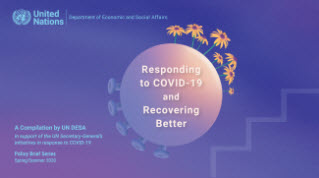 Responding to COVID-19 and Recovering Better is a compilation volume of UN DESA’s special policy brief series on the economic and social impact of COVID-19, which aims to complement and support the Secretary-General’s initiatives in response to COVID-19.
Responding to COVID-19 and Recovering Better is a compilation volume of UN DESA’s special policy brief series on the economic and social impact of COVID-19, which aims to complement and support the Secretary-General’s initiatives in response to COVID-19.
It presents detailed analysis and solid evidence needed for effective decision-making on a number of critical social and economic issues – including designing inclusive stimulus packages; preventing a global debt crisis; supporting countries in special situations; protecting the most vulnerable groups of people; strengthening the role of science, technology and institutions for an effective response; and working together to build back better and achieve the 2030 Agenda for Sustainable Development.
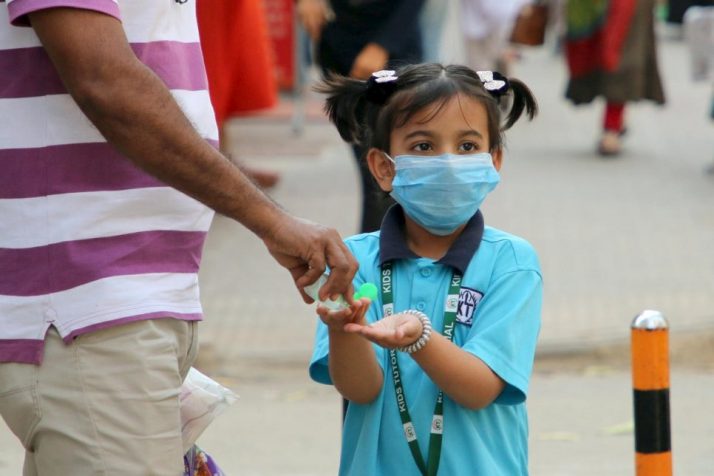
We need solidarity, political will and innovative policy action to protect vulnerable people and their well-being, and uphold the right to health, including access to information, care and medical services.
* When Everyone is Included, Everyone Benefits. *
For more information about United Nations Coronavirus global health emergency, please visit:
https://www.un.org/coronavirus
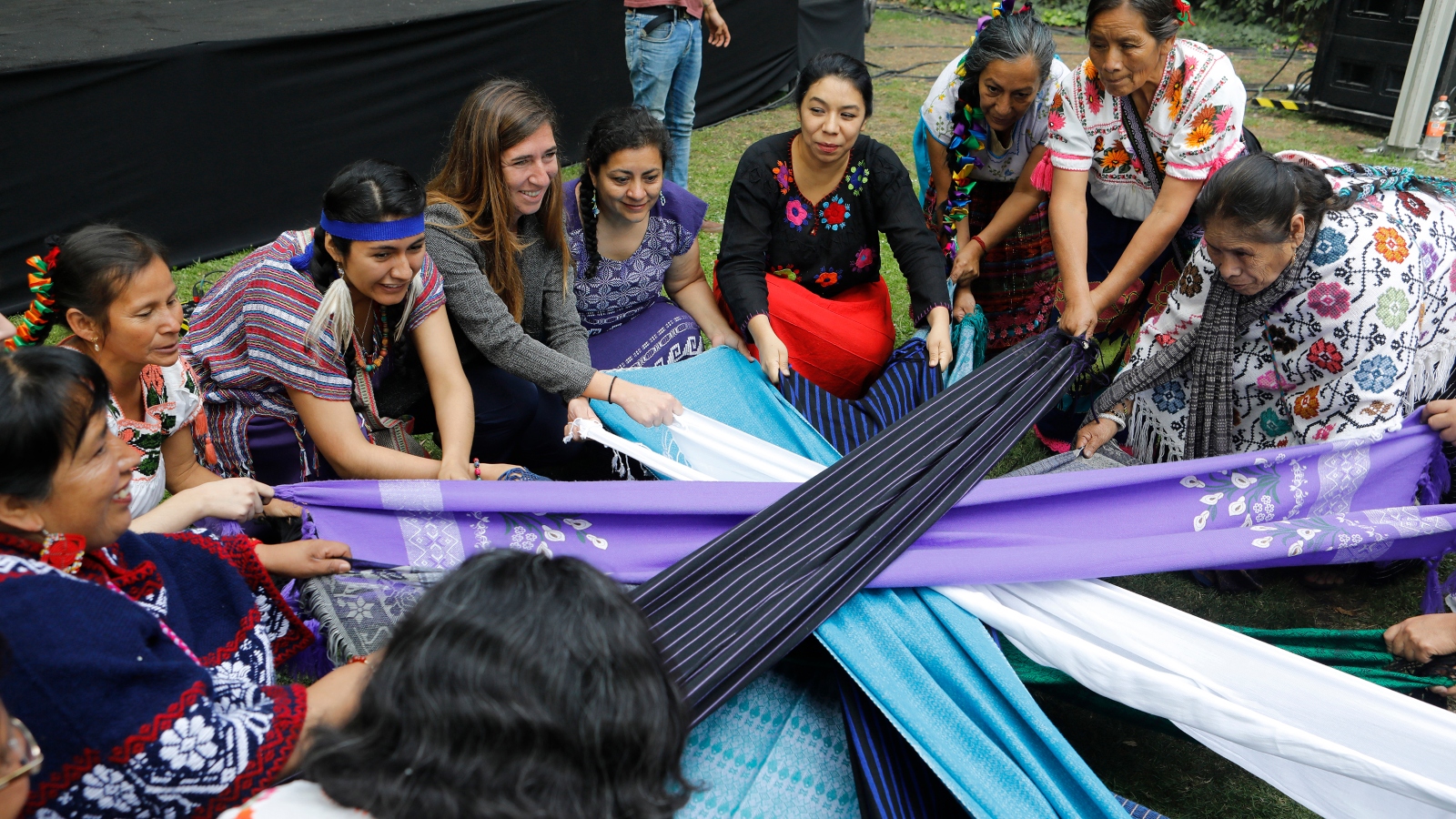
 Welcome to the United Nations
Welcome to the United Nations
